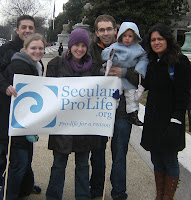A Critique of Mary Anne Warren’s On the Moral and Legal Status of Abortion, Part IV
In part one, I examined Warren’s claim about humanity, in part two I examined Warren’s qualifications for personhood and showed why the unborn qualify, and in part three
I examined Warren’s two questions about personhood and showed that her
position fails to disqualify the unborn from personhood. In this
article, I will examine her argument about potentiality.
4. Potential Personhood and the Right to Life
Warren
asserts that she has shown that a fetus does not resemble a person in
any way which can support the claim that it has even some of the same
rights. In fact, I have shown that a fetus does exhibit the same
qualities that make any of us a person — the inherent capacity to
perform personal functions. Warren has not shown what she has attempted
to show, she has merely asserted it and claimed that anyone who
disagrees just doesn’t know what a person is.
Warren
now turns to arguing about potentiality. She claims that just merely
having the potential to be a person doesn’t mean that the unborn has the
same rights as actual persons. In this case, Warren is making two
fundamental mistakes. First, she is confusing human development with
construction. Human beings do not develop piece by piece, like cars on
an assembly line, but they develop themselves from within. See this article
for more detail. The second fundamental mistake is that Warren is
confusing active potential with passive potential. Fellow pro-life
advocate Daniel Rodger explains this quite well in an article he has written.
This
distinction is an important one. Daniel uses the example of the
ingredients in a cake, but the same argument works with Stith’s example
of cars. You can’t look at a hunk of metal and call it a car. This is
because that metal could be used for anything: a car, a boat, a house,
Christmas ornaments, whatever. These items (like the flour, sugar, eggs,
and milk for the cake) have the passive potential to become a car. They
won’t actually become a car until all the pieces are put together.
Living things are different. Human beings have the active potential to
develop human and personal properties. They have this potential due to
their inherent capacities to develop these properties. So an argument
from potential is not stating that anything with the potential to become
a human being is valuable. It would be a strawman argument to claim that we’re saying that sperm and eggs
are persons. It is simply claiming that a person is a person by virtue
of the kind of thing it is, an entity with the inherent capacity for
personal properties.
Warren does argue that it may be
wrong to kill a potential person when that potential person is not violating anyone’s
rights. Now, I don’t think that there really are any potential persons,
as I argued in my article responding to pro-choice philosopher Dean
Stretton. Either you are a person or you’re not. Warren is correct that a
potential person does not have rights that would supercede an actual
person. The problem is that if something is a potential person, it is
only potential in the passive sense that I outlined above. Something
with the active potential for personal qualities is a person already.
Warren lays out her case with an analogy that actually serves to
illustrate my point, and not hers. Her analogy is as follows:
“Suppose
that our space explorer [from part two] falls into the hands of an
alien culture, whose scientists decide to create a few hundred thousand
or more human beings, by breaking his body into its component cells, and
using these to create fully developed human beings, with, of course,
his genetic code. We may imagine that each of these newly created men
will have all of the original man’s abilities, skills, knowledge, and so
on, and also have an individual self-concept, in short that each of
them will be a bona fide (though hardly unique) person. Imagine that the
whole project will take only seconds, and that its chances of success
are extremely high, and that our explorer knows all of this, and also
knows that these people will be treated fairly. I maintain that in such a
situation he would have every right to escape if he could, and thus to
deprive all of these potential people of their potential lives; for his
right to life outweighs all of theirs together, in spite of the fact
that they are all genetically human, all innocent, and all have a very
high probability of becoming people very soon, if only he refrains from
acting.”
There are actually two fatal flaws to
Warren’s analogy. The first is that you can’t harm someone who is not in
existence. Assuming that each of his cells can be considered legitimate
potential human beings, there is no human being in existence to harm
(whether or not you want to argue over personhood). If he refuses this
procedure, he is not harming anyone, person or not. [1]
Second,
the explorer’s cells are only potential human beings and persons in the
passive sense. That is, they are not living, human organisms, just
cells that belong to the parent organism, the explorer. They are only
potential persons in the same passive sense that flour is a potential
cake or a hunk of metal is a potential car. They do not have the
potential for personal properties in the same way that unborn human
beings do.
So in short, I agree with Warren that he has
a right to escape if he can, but not for the reason Warren thinks. I
also agree that he has a right to escape no matter the length of his
captivity, or whether he was deliberately captured or was captured due
to carelessness. The problem is that this situation is not analogous to
killing an unborn human being through abortion. It’s a false analogy.
So
to summarize, Warren’s first argument fails because the pro-life
position is really not fallacious, as she alleged. Warren’s second point
fails because she didn’t provide any evidence or arguments to support
her position, and I have shown that the unborn certainly do qualify as
persons. Warren’s third point fails because human value does not develop
gradually. And Warren’s fourth point fails because her argument is a
false analogy and confuses active potentiality with passive
potentiality.
This ends Warren’s essay proper, but she
later included a postscript in which she tries to justify why we should
not allow the killing of infants even though they don’t qualify as
persons under her view. I will examine her postscript in the last part
of this series.
[1] This probably needs a bit more
elaboration. There are other considerations, such as the metaphysics of
time, as well as what obligations, if any, we have to people who are not
in existence yet but will be. It’s not within the scope of this essay
to go into more detail, but I do intend to go into more detail in the
future at some point. Suffice it to say that I believe this point to be a
valid one for the purpose of responding to Warren’s thought experiment,
since these “potential humans” would only be coming into existence due
to an act of violence by a hostile alien race.



Warren's space explorer analogy is absurd on so many levels. This can't possibly be the best of pro-choice philosophical arguments.
It's definitely not, but unfortunately her essay is popular among pro-choice people. Someone I debated on abortion once quoted Warren's criteria for personhood, and I see her quoted in the literature.